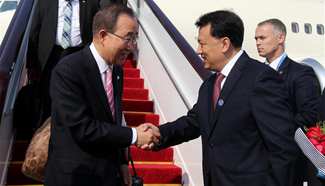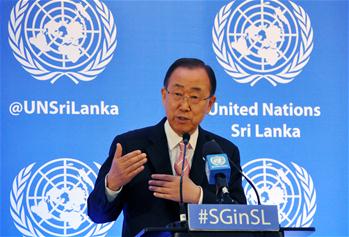BEIJING, Sept. 3 (Xinhua) -- China's top legislature on Saturday ratified the Paris Agreement on climate change, a significant international legal document that outlines post-2020 global climate governance.
Lawmakers voted to adopt "the proposal to review and ratify the Paris Agreement," at the closing meeting of the week-long bimonthly session of the National People's Congress Standing Committee.
The much-anticipated Paris Agreement on climate change is the third document to attempt to address climate change, following the 1992 United Nations Framework Convention on Climate Change and the 1997 Kyoto Protocol.
BIGGER ROLE IN GLOBAL CLIMATE GOVERNANCE
"Ratifying the agreement accords with China's policy of actively dealing with climate change," according to the proposal, which added that addressing climate change would help the country realize sustainable development.
The ratification will "further advance China's green, low-carbon development and safeguard environmental security," it said.
"Ratifying the agreement is conducive to China's development interests," and it will also help the country "play a bigger role in global climate governance," according to the proposal.
China signed the Paris Agreement at UN Headquarters in New York on April 22, Earth Day, sending a strong messaging to the international community as it joins forces against global warming.
Vice Premier Zhang Gaoli, the special envoy of President Xi Jinping, signed the document and announced that China aimed to finalize domestic legal procedures to ratify the pact before the G20 summit in Hangzhou.
On Dec. 12, 2015, after nearly two weeks of hard bargaining, negotiators representing 196 parties to the UN conference on climate change in Paris (COP21) sealed the pact, aiming to reverse temperature increases, mainly caused by carbon emissions.
The agreement sets a target of holding the global average rise in temperature below 2 degrees Celsius above pre-industrial levels, and preferably below 1.5 degrees.
It is a major milestone for global climate negotiations, especially after the failed climate summit in Copenhagen, Denmark, in 2009 and disputes among countries on their responsibilities.
Environmental experts said that, during the Paris negotiations, China helped resolve several thorny issues.
To fulfill its commitment to the Paris climate pact, China will have to cut its carbon emissions per unit of GDP by 60-65 percent by 2030 from 2005 levels, increase non-fossil fuel sources in primary energy consumption to about 20 percent, and peak its carbon emissions by 2030.
These targets were reflected in China's intended national determined contribution (INDCs) and also in its 13th Five-Year Plan (2016-2020).
After the signing, the Paris Agreement is still missing the support of 55 nations that account for 55 percent of global greenhouse gas emissions before it can enter into force.
Countries still have one year to ink the agreement as it is open for signatures until April 21, 2017.











